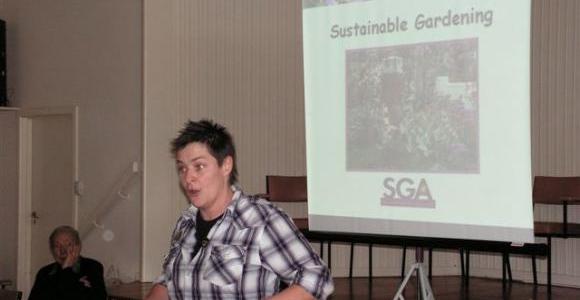
Healthy Gardens and People
You are here

Helen Tuton, from Sustainable Gardening Australia, is a qualified soil scientist and horticulturalist.
Helen explained that soil is a living, breathing organism and its health needs to be maintained.
Clay is easier to work with than sandy soil as it holds water and nutrients well.
Sustainable gardening does not compromise the environment and is all about not causing damage, leaving health and balanced ecosystems.
Diversity provides balance. Boroondara is a hot spot for variety of flora and fauna – including native water rats and platypus as well as rare butterflies.
Good sustainable gardens should minimise the water required to maintain them. Worms aerate the soil and can increase its water holding capacity by up to 10%. Don’t overwork clay soil as it reduces the amount of air in the soil, especially when wet.
Loosen the soil around hole when planting in clay so that water will drain away and not drown the plant.
Soils need to be aerated – preferably with a fork. Don’t dig or churn the soil up. Just make holes with the tines of the fork and add gypsum, a clay breaker, allowing water and air to penetrate the soil. Gypsum is pH neutral – dust it on the soil like icing sugar on a cake, then mulch. Don’t buy liquid gypsum as it doesn’t penetrate and is detrimental to worms, lizards and frogs. Ants indicate dry soil – add organic matter and mulch. Ants encourage aphids, which they feed on; this in turn encourages sooty mould. You can also grow tansy, which repels ants. Aphids are attracted to yellow – use the lids of Vegemite jars filled with water to attract and drown them.
All soils benefit from compost – recycle household organic matter and use regularly, twice per year. Mulch on top of compost – up to 5cm. Use straw-based mulches in preference to stones or rocks, which retain heat, which can burn plants.
Compost is great, but you need to aerate the bins weekly.
Helen also advised us to use Charlie Carp, Seasol or Powerfeed to fertilise – her rule being don’t use anything requiring a spoon as it’s like steroids for plants.
Use beer in a saucer rather than snail pellets; alternatively sawdust or coffee grinds will discourage snails.
Blood and bone repels possums – put it in stockings and hang in trees, but you will need to replace it every six weeks or so.







